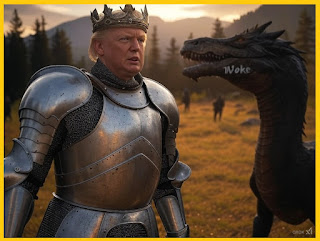Since his return to the White House, Donald Trump has launched an offensive against "woke ideology," a cultural and political movement advocating for gender equality, LGTBIQ+ rights, and multiculturalism. This war has marked a turning point in both American and global politics, garnering both support and controversy.
But what does "woke" mean? The term "woke" derives from the English verb "wake," meaning to awaken, and has become a symbol of social awareness in the United States. Originally, it was used to refer to being alert to social injustices, especially racism. However, in recent years, it has also encompassed gender equality, LGTBIQ+ rights, and other progressive causes. For its critics, including Trump and his allies, "wokism" represents a threat to traditional values, national independence, and individual freedom, morphing into a form of tyranny that attempts to impose a "single way of thinking."
Anti-Woke Executive Orders and Policies
From his first actions as president, Trump has shown a clear rejection of woke ideology. Among his initial executive orders, notable are those eliminating government programs promoting "gender ideology" and Diversity, Equity, and Inclusion (DEI). He has declared that he will only recognize two genders: male and female, and has urged companies and universities to abandon their DEI policies under threat of investigations and potential lawsuits.
Trump's anti-woke push has resonated in the private sector. Companies like Walmart, Disney, and other multinationals have recalibrated their diversity policies, fearing repercussions or seeking alignment with the new administration. This has created an environment where progressive corporate policies are being reviewed or abandoned, showcasing how presidential rhetoric can influence business culture.
For its supporters, this means a return to traditional values and a rejection of what they consider "reverse discrimination" or policies that favor minorities at the expense of the majority.
Global Implications
Trump's crusade against wokeism is not just a domestic U.S. policy; it has global implications. Leaders like Javier Milei in Argentina and other conservative leaders in Europe have adopted similar rhetoric, indicating a global countercurrent against what they see as excesses of progressivism.
While some view these policies as a return to common sense and meritocracy, others see them as a direct attack on civil rights advancements and social justice. What is clear is that this confrontation has placed woke ideology at the center of public debate, forcing all actors to take a stance on an issue that will undoubtedly remain relevant in American politics and beyond. This is a battle between what is perceived as exaggerated progressivism (woke) and a return to common sense.
Anti-Woke Executive Orders and Policies
From his first actions as president, Trump has shown a clear rejection of woke ideology. Among his initial executive orders, notable are those eliminating government programs promoting "gender ideology" and Diversity, Equity, and Inclusion (DEI). He has declared that he will only recognize two genders: male and female, and has urged companies and universities to abandon their DEI policies under threat of investigations and potential lawsuits.
Trump's anti-woke push has resonated in the private sector. Companies like Walmart, Disney, and other multinationals have recalibrated their diversity policies, fearing repercussions or seeking alignment with the new administration. This has created an environment where progressive corporate policies are being reviewed or abandoned, showcasing how presidential rhetoric can influence business culture.
For its supporters, this means a return to traditional values and a rejection of what they consider "reverse discrimination" or policies that favor minorities at the expense of the majority.
Global Implications
Trump's crusade against wokeism is not just a domestic U.S. policy; it has global implications. Leaders like Javier Milei in Argentina and other conservative leaders in Europe have adopted similar rhetoric, indicating a global countercurrent against what they see as excesses of progressivism.
While some view these policies as a return to common sense and meritocracy, others see them as a direct attack on civil rights advancements and social justice. What is clear is that this confrontation has placed woke ideology at the center of public debate, forcing all actors to take a stance on an issue that will undoubtedly remain relevant in American politics and beyond. This is a battle between what is perceived as exaggerated progressivism (woke) and a return to common sense.
An enthralling story of love, friendship and honor in the Olympic Games (2,600 years ago)
“Life debt” (Vicente Fisac, Amazon): https://a.co/d/hono34C


No comments:
Post a Comment